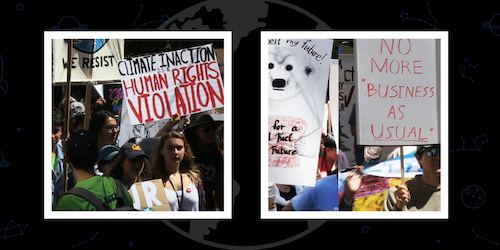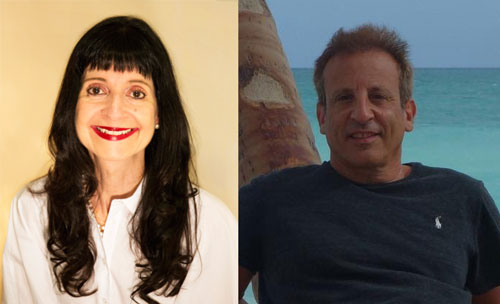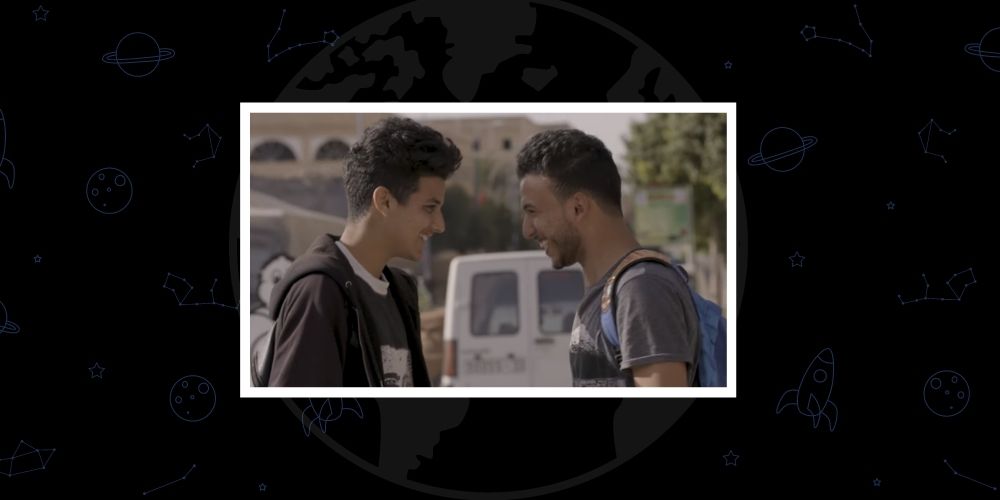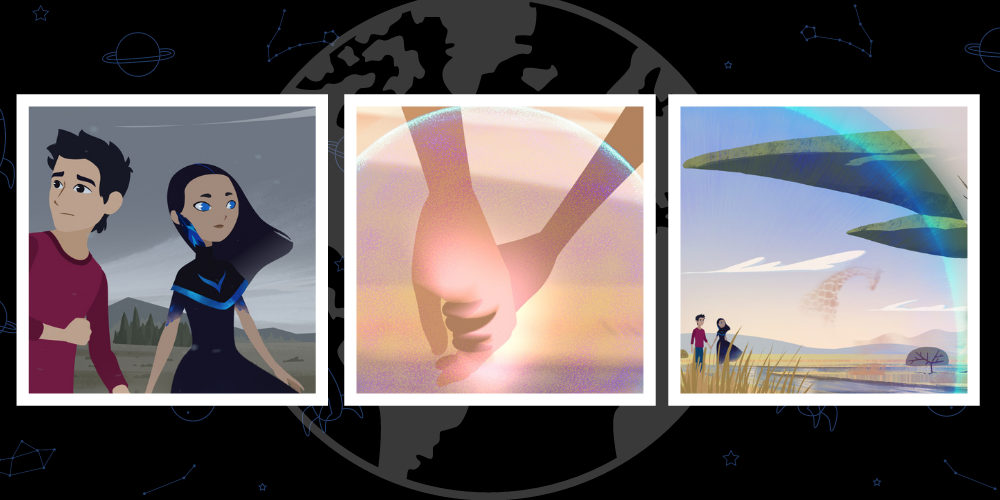Diesen Monat weiter der YouTube-Kanal des Planet Classroom Network, Publikum kann screenen Was tun gegen Klimastörungen? (Kuratiert von Commffest), the provocative documentary focused on the hot topic permeating our news for a quarter of a century. Eric Simon, the film’s director, says he was focused on capturing as many perspectives as possible for his work in an effort to facilitate sustainable solutions. In Was tun gegen Klimastörungen?, we hear from environmentalists, climate experts, members of Congress as well as concerned activists and citizens – all of whom focus on what we need to do to preserve our planet. Simon’s film captures the passion of protestors and their disdain for the capitalistic economic system while also exploring climate solutions ranging from switching to 100% renewable energy, reducing market prices and reworking our existing transportation systems.
Eric Simon spent roughly half of his childhood in Paris, Frankreich, and the other half in Southern California. After getting a Masters in environmental management from Duke University, he spent five years working for the state air quality agency in Sacramento, Kalifornien. He then moved to the San Francisco area, where he worked for a start-up high tech company. He then got a Masters of Education from the University of San Francisco, and taught both math and French in public high schools. While studying in Germany, he became interested in documentary filmmaking.
Die globale Suche nach Bildung is pleased to welcome Director Eric Simon.
Eric, early on in your film, it is brought up that most politicians acknowledge the existence of climate change but are afraid of the political ramifications behind it. How can American citizens “make the politics right” for our representatives in regard to climate change? What can we do as citizens to encourage politicians to steer clear of the fossil fuel industry?
Allgemein gesagt, I am in favor of taking money out of politics – for instance, by figuring out a way to enable viable candidates to have equal time on television for free, and by getting rid of paid political advertisements. Zweitens, I don’t agree that in all instances we should be trying to make the politics right for our representatives in regard to climate change. In cases where politicians accept financial support from oil companies, rather than trying to make the politics right for these politicians by settling for inconsequential reforms, we should simply vote these politicians out, or never vote them into office to begin with.
As for the many politicians who acknowledge the seriousness of the climate crisis and say they want to do something about it, many of them are concerned that financial disincentives for using fossil fuels are a form of taxation, and these politicians don’t want to be perceived as favoring higher taxes. So I think that citizens need to communicate to their elected officials about the importance of having the right incentives to phase out of fossil fuels. Citizens need to band together to let politicians know they will not be elected or re-elected unless they work on moving our society away from fossil fuels.
For citizens who want to start making changes in their lives to oppose the effects of climate change, where would you suggest they begin? What are simple steps to reduce waste for beginners who may be clueless?
I think where people begin with respect to facing the climate crisis depends on their interest. There are technological solutions and there are political solutions. Someone interested in engineering might want to learn about how we can store energy produced by solar panels, beispielsweise. Someone with an interest in vegetation might want to think about what kinds of trees we should be planting. Someone with an interest in nutrition might want to think about how society can shift to a more planet-friendly diet. Someone interested in transportation planning might want to focus on the best ways to get people out of their cars. Someone interested in economics might want to think about how to send the right market signals so as to modify people’s behavior. Someone who likes to organize events might want to think about how to set up community meetings where people can share their ideas. Someone with an interest in law might want to think of what laws need to change.
On the subject of reducing waste, while there are significant emissions associated with the transportation of waste, the whole topic of waste management is generally outside the realm of emissions of gases that contribute to climate change, and I don’t claim to have much knowledge about the best ways to reduce waste. I would say, obwohl, that the profitability of a company such as Apple depends on a business model where consumers throw out products less than three years old, and that ought to change too. While we need to act urgently to halt the current climate trends, we also have to recognize that the problem on our hands is at least two centuries in the making. Recreating a society that is truly harmonious with the planet may also take that long.
California has led by example in terms of taking steps to improve the climate crisis, such as setting standards for cars. Many other states have seen to follow suit in their efforts to reduce waste and reuse energy. What are other examples California has displayed in terms of solving the climate crisis? What policies could other states easily adopt as their own?
I would say that an important example of something California has done right with respect to the climate crisis was presented in the film – by committing to a complete shift to clean, renewable sources of electricity. Auch, last September, California Governor Gavin Newsom signed an executive order requiring all new passenger vehicles sold in California to be electric by 2035. While that kind of measure needs a significant amount of lead time before implementing, when we think of something that could take effect now, perhaps we ought to consider something along the lines of what Norway has done, where they have taxed gasoline vehicles to make them more expensive than electric vehicles, and the government has used a lot of that revenue to build EV infrastructure.
I am not an expert on what states can or can’t adopt, but according to an attorney I spoke to who looks into where states have jurisdiction, states are not precluded from implementing the kind of approach that has been implemented in Norway. Often state representatives will make excuses, saying they can’t do anything without the approval of the federal government, but that’s not true. We should also always be aware that for any measure that benefits the planet, there are people who have a vested interest in the status quo willing to litigate against needed change.
Politicians who look for reasons to dismiss the crisis for their own personal benefit simply need to be voted out of office. That should be the easy part. The greater challenge is identifying the politicians who acknowledge the climate crisis, but who dismiss appropriate measures as not feasible. We should always start with the premise that almost any measure is feasible, if it is backed by the majority of the people.
Was sind Ihrer Meinung nach die wichtigsten Erkenntnisse für Ihr Publikum in Ihrem Film?? Wie hoffen Sie, dass Ihr Film etwas bewirken wird??
Als Filmemacher, one goal I had was to capture as many voices as possible, in a way that also makes sense. I would prefer to talk not about my intended takeaways for the audience, sondern, what I learned in the time I devoted to making the film. Perhaps the main conclusion I reached after spending a couple years thinking about the climate topic is that our incentive system is all wrong. We are being penalized to do something that’s better for the planet, like buying and driving an electric vehicle, while we pay less for harming the planet with gasoline vehicles. That’s not sustainable.
I would also add that I see what I would describe as three dimensions to confronting the climate crisis. Erste, there are the solutions. Zweitens, there is finding the right venue for presenting these solutions and deciding on the measures to be taken. Und schlussendlich, there is the need to gather enough support for the steps to be taken – to overcome the resistance from the forces acting in their short-term, economic self-interest.
One thing I developed during the making of the film is an aversion towards the word “hope”. Lord Byron wrote:
“But what is Hope? Nothing but the paint on the face of Existence, the least touch of truth rubs it off, and then we see what a hollow-cheeked harlot we have got hold of.”
In Spanish and Portuguese, the word for “to hope” – “esperar” – also means “to wait”. Waiting does not solve anything. If my film can help people get beyond the stage of whining about the problem, and actually facilitate the consideration and discussion of solutions, then, in my eyes, the film has been a success.
Thanks Eric.
C.M. Rubin and Eric Simon







Jüngste Kommentare